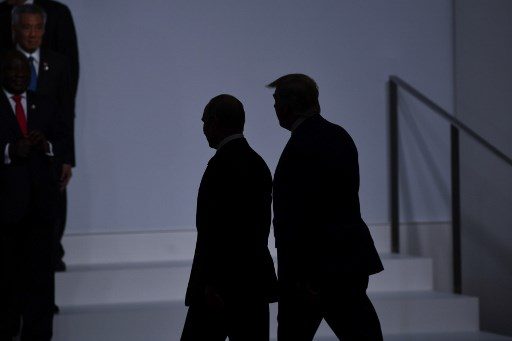SUMMARY
This is AI generated summarization, which may have errors. For context, always refer to the full article.

PARIS, France – Western nations and Russia scrambled on Friday to save a major military surveillance treaty after US President Donald Trump threatened to withdraw over accusations that Moscow was failing to comply.
While Russia said it would not abandon the Open Skies treaty, NATO envoys were meeting to formulate a response and a group of 10 European nations said in a joint statement they regretted Trump’s threat – his latest withdrawal from an international agreement.
The pact allows its nearly 3 dozen signatories to carry out short-notice flights over one another’s territory to monitor potential military operations.
Members include countries across Europe and the former Soviet Union, as well as the United States and Canada.
Trump accused Moscow on Thursday, May 21, of not adhering to the agreement designed to bolster military transparency and enhance confidence between world powers.
“We regret the announcement by the United States of its plan to pull out of the Open Skies treaty, even though we share the concerns about how the accord is being carried out by the Russian Federation,” the European nations said in a joint statement.
“This treaty remains functional and useful,” said the document signed by France, Germany and 8 other EU nations.
The US accuses Russia of blocking flights over certain sites and forbidding surveys of military exercises, normally allowed under Open Skies.
‘Unjustified restrictions’
The Europeans said they would work to resolve “outstanding questions” with Moscow, including “unjustified restrictions” imposed on flights over Kaliningrad – a Russian exclave bordered by Poland and Lithuania.
“We continue to urge Russia to lift these restrictions,” they said.
Ambassadors to NATO, whose membership overlaps with parties to the treaty, are meeting on Friday, May 22, to discuss the US withdrawal, due to take effect in 6 months.
Moscow said on Friday it would continue observing the treaty even if the US pulls out.
“As long as the treaty is in force, we intend to fully follow all the rights and obligations that apply to us from this treaty,” Deputy Foreign Minister Alexander Grushko told the RIA Novosti news agency.
Later, a foreign ministry statement accused the United States of pointing the finger at Russia “to camouflage their destructive actions.”
“The United States seeks to create the impression that they, their allies and their associates have unquestionably implemented this treaty. It is not the case, we have many questions,” it said.
Grushko warned that the US pullout would damage European security and harm the interests of US allies.
China, which is not a party to the treaty, expressed “deep regret” over the US move, calling it a “display of the United States’ entrenched Cold War mentality.”
‘Security and peace’
The withdrawal “will have a negative impact on the international arms control and disarmament process,” foreign ministry spokesman Zhao Lijian told journalists in Beijing on Friday.
US Secretary of State Mike Pompeo said the United States could reconsider “should Russia return to full compliance with the Treaty.”
Open Skies is the third important military pact that Trump has withdrawn from since coming to office in January 2017.
He has also dropped the 2015 JCPOA agreement to prevent Iran from advancing its nuclear weapons program and the 1988 Intermediate Range Nuclear Forces Treaty with Russia.
In both cases, Trump accused the other side of violating treaty requirements.
The latest move adds to question marks over New START, a pact that limits the number of nuclear missiles the United States and Russia can deploy, which is due for renewal by early 2021.
The Open Skies treaty carried more political than military weight, according to Corentin Brustlein of the Paris-based French Institute of International Relations.
Large spy agencies do not need “open skies” to gather information on other countries’ military activities, he told Agence France-Presse.
“But the information gathered under Open Skies is shareable and shared,” he said, including with signatory states that do not have strong intelligence agencies of their own.
“The only negative consequences of this withdrawal will be felt by allies of the United States… It is yet another demonstration of what little regard the US administration has for Europe’s security concerns.” – Rappler.com
Add a comment
How does this make you feel?
There are no comments yet. Add your comment to start the conversation.